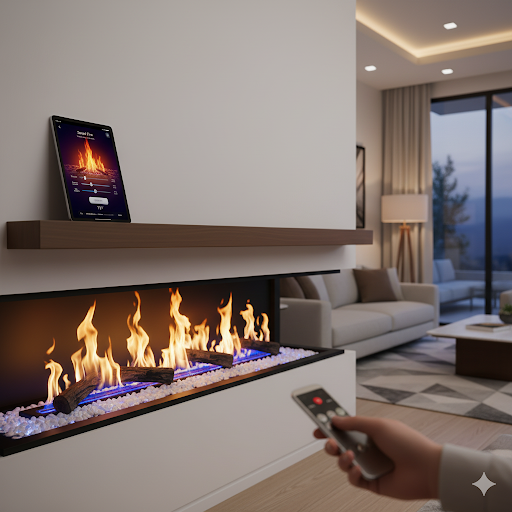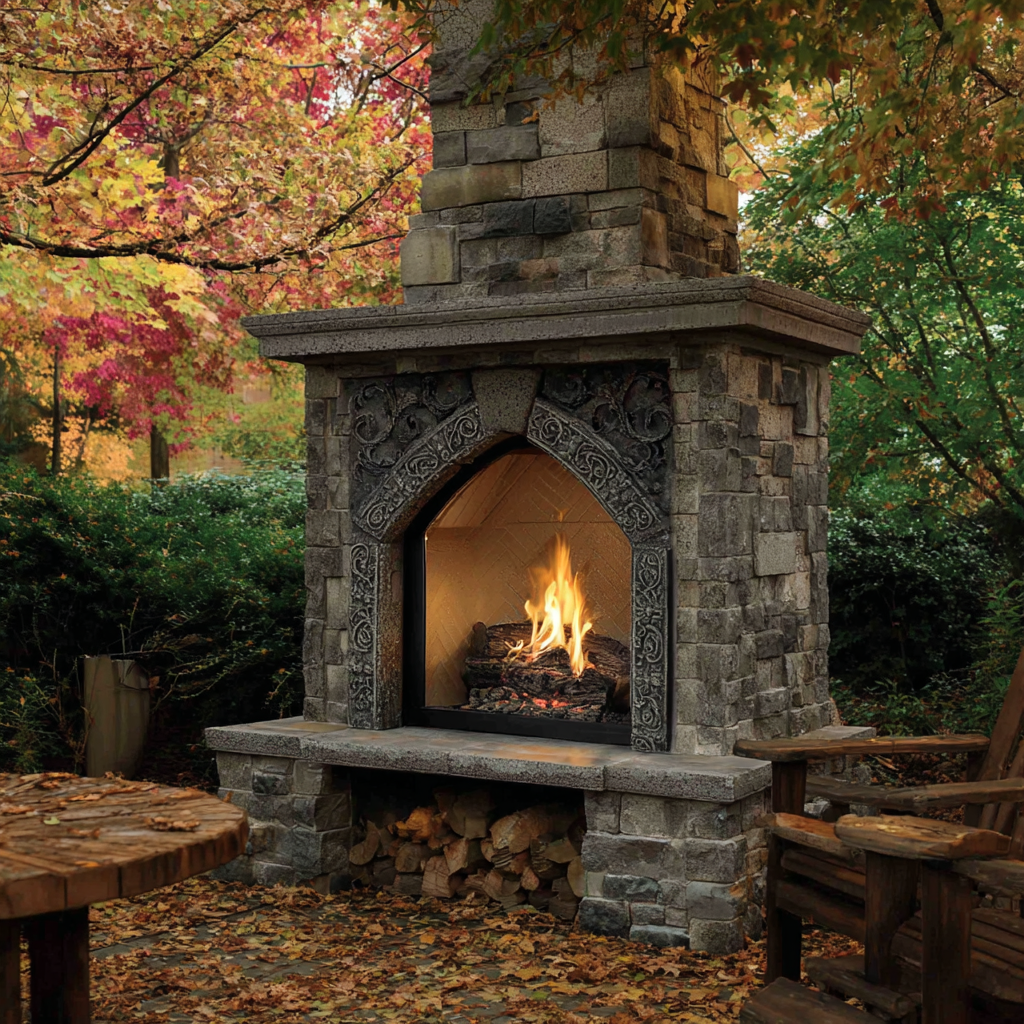- Introduction
Fire pits have become an increasingly popular addition to outdoor spaces, creating a warm and inviting atmosphere for gatherings with friends and family. When it comes to fire pits, two popular options are propane fire pits and gas fire pits. Both offer unique advantages and features that make them appealing to homeowners. In this article, we will explore the differences between propane and gas fire pits, discuss their benefits, and address common questions surrounding these outdoor heating options.
Propane fire pits utilize propane gas as their fuel source, which is stored in portable tanks. These fire pits typically feature a burner mechanism that ignites the propane to produce a beautiful flame. On the other hand, gas fire pits are designed to be connected directly to a natural gas supply line or a propane tank. They feature burners that are compatible with natural gas, offering a continuous fuel supply.
- Importance and popularity of fire pits in outdoor settings
Fire pits have become a staple in outdoor living spaces, serving as a focal point and gathering spot for various occasions. Whether it's a cozy evening gathering, a backyard party, or simply enjoying the tranquil ambiance, fire pits create a captivating and comforting environment. They provide warmth, enhance the aesthetics of outdoor areas, and extend the usability of outdoor spaces into cooler seasons.
As we delve deeper into the world of propane and gas fire pits, we'll explore their unique features, benefits, and considerations to help you make an informed decision for your outdoor space. Let's explore the distinct qualities of these fire pit options and discover which one might be the perfect fit for you.
Gas fire pits are designed to be connected to a natural gas supply line or can be used with propane by attaching a compatible conversion kit. The key characteristic of gas fire pits is their ability to provide a continuous fuel supply, eliminating the need to constantly monitor and refill propane tanks. With a flick of a switch or the turn of a knob, you can enjoy an instant and consistent flame.
- Definition and characteristics of propane fire pits
Propane fire pits, on the other hand, utilize portable propane tanks as their fuel source. These tanks are easily refillable and offer flexibility in terms of fire pit placement. Propane fire pits are highly portable, allowing you to move them around your outdoor space or even take them with you on camping trips or to other locations.
- Comparison of gas fire pits and propane fire pits
When deciding between gas fire pits and propane fire pits, several factors come into play:
- Fuel source and convenience: Gas fire pits offer the convenience of a continuous fuel supply through a natural gas line, eliminating the need for propane tank refills. Propane fire pits, on the other hand, provide portability and the ability to use them in various locations.
- Installation and portability: Gas fire pits require professional installation if connected to a natural gas line, while propane fire pits are generally easier to set up and move around as needed.
- Cost and maintenance: Gas fire pits typically require an initial installation cost, including connecting to a gas line. Propane fire pits may have lower upfront costs but require periodic propane tank refills.
III. Benefits of Propane Fire Pits
- Versatility and ease of use
Propane fire pits are highly versatile and can be placed in various locations within your outdoor space. Their portability allows you to rearrange your seating area or move the fire pit to different areas of your backyard. Propane fire pits also offer convenient ignition systems, often with adjustable flame settings, allowing you to control the intensity of the fire easily.
- Environmental considerations
Propane is a cleaner-burning fuel compared to wood-burning fire pits, producing fewer emissions and particulate matter. It eliminates the need for firewood and reduces the environmental impact associated with traditional wood-burning fires.
- Flexibility in placement options
Due to their portability and the absence of a direct gas line connection, propane fire pits offer flexibility in placement options. You can position them on your patio, deck, or any outdoor area, provided you follow safety guidelines.
- Efficient heating capabilities
Propane fire pits are designed to provide efficient heating, generating a significant amount of warmth for your outdoor space. Many propane fire pits come with features like heat shields and reflectors, maximizing heat output and ensuring a cozy atmosphere on cooler evenings.
- Benefits of Gas Fire Pits
- Continuous fuel supply
One of the significant advantages of gas fire pits is the uninterrupted fuel supply when connected to a natural gas line. You won't have to worry about running out of fuel or the hassle of refilling propane tanks.
- Natural flame appearance
Gas fire pits create a natural-looking flame that closely resembles the appearance of a traditional wood-burning fire. The flame is consistent and adjustable, allowing you to customize the ambiance to your desired level.
- Customizable flame control
Gas fire pits often come with flame control mechanisms, such as knobs or switches, allowing you to adjust the flame height and intensity. This feature gives you greater control over the fire and lets you create the desired atmosphere for different occasions.
- Compatibility with natural gas hookup
If your outdoor space has a natural gas hookup, a gas fire pit can be seamlessly integrated into your existing gas supply line. This eliminates the need for propane tanks and provides a hassle-free experience, as the fire pit is always ready to be ignited with a simple flip of a switch.
- Low maintenance and cost-effective operation
Gas fire pits require minimal maintenance compared to wood-burning fire pits. There is no need to clean up ash or deal with the disposal of burnt wood. Additionally, gas fire pits tend to be more cost-effective in the long run, as there are no ongoing expenses for propane refills.
- Addressing Common Questions
- How long will a 20 lb propane tank run a fire pit? The duration of a 20 lb propane tank depends on the fire pit's burner size and heat output. On average, a 20 lb tank can last anywhere from 8 to 20 hours of continuous use.
- How long does propane last in a gas fire pit? The longevity of propane in a gas fire pit also depends on factors such as the burner size and heat output. However, since gas fire pits are typically connected to a natural gas supply, there is no need to worry about propane running out.
- Why are propane fire pits more expensive? Propane fire pits can be more expensive initially due to the costs associated with the burner mechanism, propane tank, and regulator. However, the cost of operating a propane fire pit over time may be lower compared to gas fire pits connected to a natural gas line.
- Do propane gas fire pits provide sufficient warmth? Yes, propane gas fire pits are designed to provide ample warmth for outdoor spaces. Many propane fire pits have adjustable flame settings, allowing you to control the heat output according to your preferences.
- Do you need rocks in a propane fire pit? Rocks or fire glass can enhance the visual appeal of a propane fire pit. They help distribute the heat more evenly and create an attractive bed for the flames.
- Can a propane fire pit be placed on a deck? Propane fire pits can be placed on a deck if certain safety measures are followed. It is important to ensure proper ventilation, use a fire pit designed for deck use, and keep a safe distance from combustible materials.
- How long will a 20 lb propane tank last for a 50,000 BTU fire pit? The duration of a 20 lb propane tank for a 50,000 BTU fire pit can vary, but it can last approximately 10-12 hours of continuous use.
- Can a propane fire pit be left outside? Propane fire pits can be left outside; however, it is recommended to protect them from extreme weather conditions by using covers specifically designed for fire pits.
- Can a propane fire pit be used in winter? Yes, propane fire pits can be used in winter, as they continue to provide warmth and ambiance even in colder temperatures. However, it's important to follow safety guidelines and take precautions in freezing conditions.
- Can a gas fire pit be used under a covered patio? Gas fire pits can be used under a covered patio, but it is crucial to ensure proper ventilation and clearance requirements are met to prevent the accumulation of gas and promote air circulation.
- How close can a propane fire pit be to a house? The exact distance requirements may vary depending on local regulations and fire safety codes. However, it is generally recommended to keep a propane fire pit at least 10 feet away from any structures, including houses.
- Can a fire pit be placed under a covered patio? Placing a fire pit under a covered patio should be done with caution. Adequate ventilation, clearance, and fire-resistant materials should be considered to ensure safety and prevent any potential hazards.
- Conclusion
In conclusion, gas fire pits and propane fire pits offer distinct advantages and cater to different preferences. Propane fire pits provide versatility, portability, and ease of use, making them an excellent choice for those seeking flexibility in placement and convenience. They are environmentally friendly and offer efficient heating capabilities, allowing you to enjoy cozy evenings outdoors.
On the other hand, gas fire pits offer the convenience of a continuous fuel supply when connected to a natural gas line. They provide a natural flame appearance, customizable flame control, and low maintenance requirements. Gas fire pits are a great option for those who have a natural gas hookup and prefer a seamless and consistent fire experience.
When considering a fire pit for your outdoor space, it's essential to assess your specific needs, available resources, and desired features. Both propane and gas fire pits have their unique benefits, so it's crucial to choose the option that aligns with your preferences and requirements.
When shopping for fire pits, consider reputable brands such as The Outdoor Plus and The Bio Flame. These brands offer a wide range of fire pit options, including fire pit tables, fire bowls, and built-in/recessed fire pits. They are known for their quality craftsmanship, innovative designs, and commitment to creating exceptional outdoor heating solutions.
Whether you're looking to create a cozy gathering spot, extend your outdoor living season, or enhance the aesthetics of your outdoor space, a gas or propane fire pit can be the perfect addition. So, explore the possibilities, consider the benefits, and select the fire pit that will elevate your outdoor living experience.























